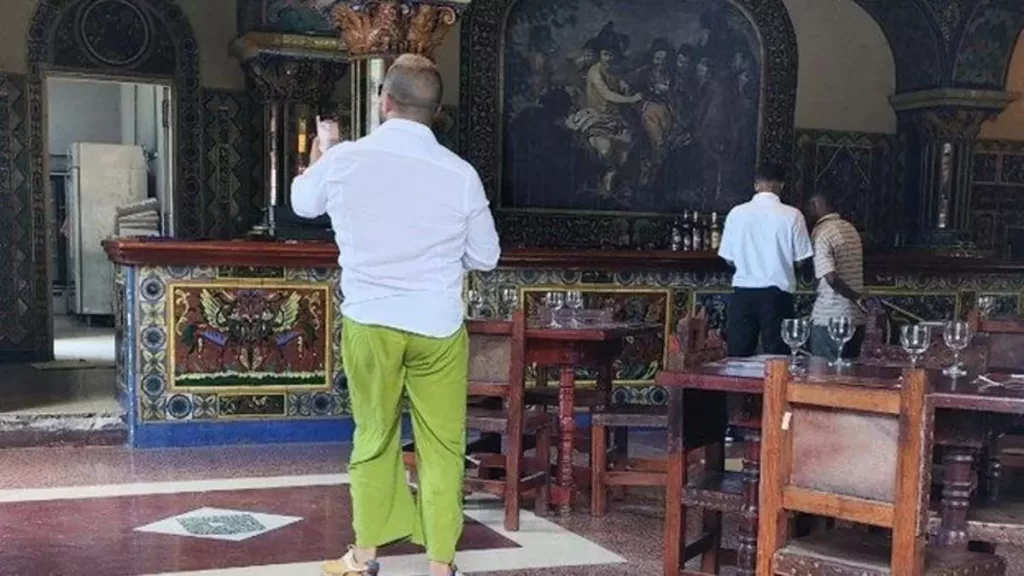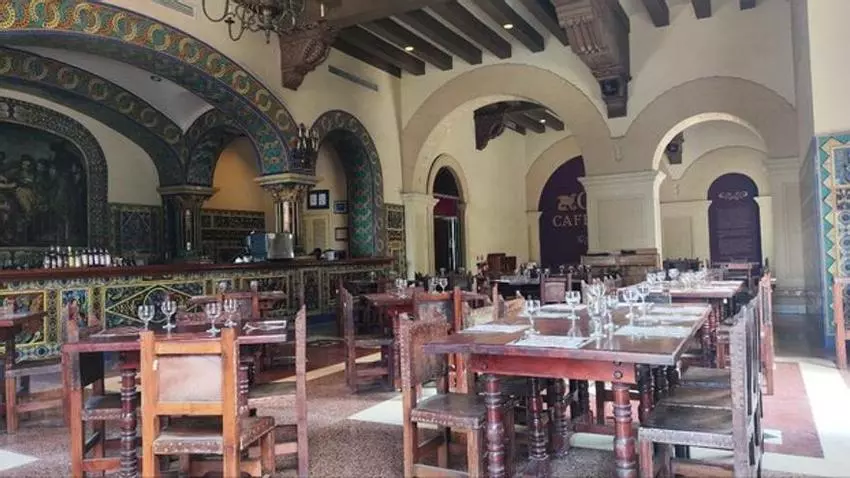
![]() 14ymedio, Juan Diego Rodríguez, Havana, 21 April 2024 — “We are state-run and our prices are low,” says an employee in an impeccable white shirt on Friday. He is standing outside the building that houses the collection of Havana’s Museum of Fine Arts. The young waiter is trying to lure customers into the building where Café Baco, a rarely visited restaurant, is located.
14ymedio, Juan Diego Rodríguez, Havana, 21 April 2024 — “We are state-run and our prices are low,” says an employee in an impeccable white shirt on Friday. He is standing outside the building that houses the collection of Havana’s Museum of Fine Arts. The young waiter is trying to lure customers into the building where Café Baco, a rarely visited restaurant, is located.
A European tourist and his Cuban girlfriend scrutinize the menu that the man has handed them outside the imposing building, once known as the Asturian Center. “Nowhere in Havana are you going to find lobster at that price,” insists the employee, directing his gaze at a group of travelers who have just gotten off a Transtur bus.
“Nowhere in Havana are you going to find lobster at that price”
“Come in. You won’t regret it,” Dayana hears him say. The 45-year-old Havana resident, who was standing nearby, falls for the sales pitch and decides to give Café Baco a try. “I didn’t even know this existed because there’s no sign on the street or anything. I’ve brought my children to this museum several times but I didn’t know it had a restaurant, much less that it sold shellfish. So I’m going to try it and we’ll see how it goes.”
Unlike tourists, who are dazzled just by the sight of lobster on the menu, Cubans are focused on other details when choosing where to spend their money at a time of high inflation. “I normally don’t eat in state-owned restaurants because I know they’re inferior,” Dayana says as she climbs the imposing staircase with marble railings, elaborate balustrades and carved parapets.
The ambience causes the Havana native to salivate. It seems like the prelude to a lavish banquet. “The food must be at the same level as this staircase,” she says sarcastically, imagining that the decor is one thing but that what’s on the plate is another. No one else climbs the steps; no other customers come in. It is around 12:30 and the place seems deserted. The echo of Dayana’s footsteps is all that can be heard inside.

Wearing a crown of grape leaves and nude to the waist, Bacchus — the Greek god of wine and food — reigns over the dining room from a wall to one side. The walls themselves are covered in dark green tiles. Elaborate arches, supported by columns with flowery capitals, give the space the air of a Spanish tavern, a place where you could sink your teeth into a nice cod, pierce an olive with your fork and enjoy a good red wine.
The baronial Spanish touch, however, is limited to the tiles and a reproduction of Diego Velázquez’ painting “The Triumph of Bacchus.” Otherwise, it is cross between a place that serves bad food and a state-run workplace marked by apathy and supply shortages. “The menu is full of items they don’t have,” Dayana says in a phone call to her sister from inside the restaurant. “I was going to tell you to come here but changed my mind because it’s so bad.”
Without bothering to lower her voice so as not to be heard by the employees, she continues telling her sister about her experience. “Just imagine, I order a fruit juice and they bring me a glass that’s half ice and half instant soda,” she says, appalled. A few yards away, a tourist who has just entered the room is is taking photos of the Velázquez mural, more commonly known as “The Drunkards.”
“The view is nice but I sat on a balcony where it’s cool because it doesn’t smell good inside”
“Of course, the view is nice but I sat on a balcony where it’s cool because it doesn’t smell good inside. You know, it smells like burnt grease, like they haven’t cleaned in a long time.” Dayana continues as though she were dictating a review for a restaurant guide. “I came in because I was tired of walking and wanted to check the place out but I already know what to expect. They don’t have most of the things on the menu.”
A waitress approaches the table with a plate of rice, a pork cutlet, some cabbage, and a few slices of cucumber. For a moment the customer thinks she has scored a great deal. Only 900 pesos compared to the more than 1,500 pesos that such a meal would cost in a privately owned restaurant in a less historic and less sumptuous location. But the feeling passes as soon as she brings the spoon to her mouth.
The soupy rice is made up of grains from different sources, the cabbage is limp, the cutlet is under-seasoned and — to top it all off — the empty vinegar cruet is sticky to the touch. “Based on how quickly they brought everything out, and the temperature of the rice and the pork, you can tell it was already was prepared,” she reflects, her cell phone pressed to her ear. Over by the wall, an inebriated woman next to Bacchus stares at the Dayana with a scornful smile.
Soupy rice, limp cabbage, under-seasoned pork cutlet, and and an empty vinegar cruet that is sticky to the touch
Though the meal was as she predicted, Dayana nevertheless feels a pang of frustration. “I’m going to order a coffee to get over it,” she says. Minutes later, the waitress brings a cup that is missing its saucer. Mixed with milk and generously sprinkled with cinnamon, the imitation cappuccino seems like an opportunity to put the bland menu out of her mind.
“No surprise, the coffee is bad. It’s mixed with a lot of other things but at least it perked me up a bit so I get up and walk home,” she says during the umpteenth phone call to her sister to tell her about Café Baco. The experience has cost her 1,195 Cuban pesos, less than four dollars at the current exchange rate on the informal market.
After the last sip, a dark, sandy-textured sediment remains in the cup. Dayana leaves 1,250 pesos on the table, takes her wallet and exits. As she is walking out, two of the drunks in the Velazquez painting, their noses red and looking directly at her, seem to be laughing harder, mocking Dayana.
____________
COLLABORATE WITH OUR WORK: The 14ymedio team is committed to practicing serious journalism that reflects Cuba’s reality in all its depth. Thank you for joining us on this long journey. We invite you to continue supporting us by becoming a member of 14ymedio now. Together we can continue transforming journalism in Cuba.
